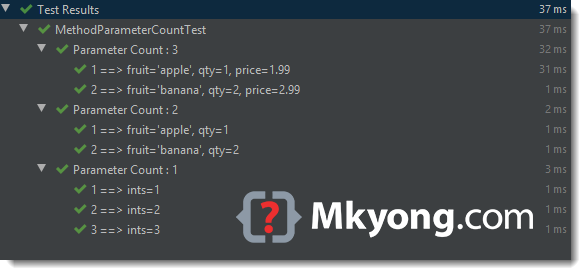JUnit 5 Test Execution Order

This article shows you how to control the JUnit 5 test execution order via the following MethodOrderer classes:
- Alphanumeric
- OrderAnnotation
- Random
- Custom Order
P.S Tested with JUnit 5.5.2
1. Alphanumeric
1.1 It sorts test methods alphanumerically.
package com.mkyong.order;
import org.junit.jupiter.api.MethodOrderer;
import org.junit.jupiter.api.Test;
import org.junit.jupiter.api.TestMethodOrder;
import static org.junit.jupiter.api.Assertions.assertEquals;
@TestMethodOrder(MethodOrderer.Alphanumeric.class)
public class MethodAlphanumericTest {
@Test
void testZ() {
assertEquals(2, 1 + 1);
}
@Test
void testA() {
assertEquals(2, 1 + 1);
}
@Test
void testY() {
assertEquals(2, 1 + 1);
}
@Test
void testE() {
assertEquals(2, 1 + 1);
}
@Test
void testB() {
assertEquals(2, 1 + 1);
}
}
Output
testA()
testB()
testE()
testY()
testZ()
2. OrderAnnotation
2.1 It sorts test methods based on the @Order values.
package com.mkyong.order;
import org.junit.jupiter.api.MethodOrderer;
import org.junit.jupiter.api.Order;
import org.junit.jupiter.api.Test;
import org.junit.jupiter.api.TestMethodOrder;
import static org.junit.jupiter.api.Assertions.assertEquals;
@TestMethodOrder(MethodOrderer.OrderAnnotation.class)
public class MethodOrderTest {
@Test
void test0() {
assertEquals(2, 1 + 1);
}
@Test
@Order(3)
void test1() {
assertEquals(2, 1 + 1);
}
@Test
@Order(1)
void test2() {
assertEquals(2, 1 + 1);
}
@Test
@Order(2)
void test3() {
assertEquals(2, 1 + 1);
}
@Test
void test4() {
assertEquals(2, 1 + 1);
}
}
Output
test2()
test3()
test1()
test0()
test4()
3. Random
3.1 It sorts test methods pseudo-randomly and supports configuration of a custom seed:
junit.jupiter.execution.order.random.seed
package com.mkyong.order;
import org.junit.jupiter.api.MethodOrderer;
import org.junit.jupiter.api.Test;
import org.junit.jupiter.api.TestMethodOrder;
import static org.junit.jupiter.api.Assertions.assertEquals;
@TestMethodOrder(MethodOrderer.Random.class)
public class MethodRandomTest {
@Test
void testZ() {
assertEquals(2, 1 + 1);
}
@Test
void testA() {
assertEquals(2, 1 + 1);
}
@Test
void testY() {
assertEquals(2, 1 + 1);
}
@Test
void testE() {
assertEquals(2, 1 + 1);
}
@Test
void testB() {
assertEquals(2, 1 + 1);
}
}
Output, random.
# Run 1
testA()
testZ()
testE()
testY()
testB()
# Run 2
testY()
testE()
testZ()
testA()
testB()
# Run 3
testA()
testB()
testY()
testE()
testZ()
3.2 Configure a custom seed junit.jupiter.execution.order.random.seed to create a repeatable test builds
In properties file.
junit.jupiter.execution.order.random.seed=99
In Maven, configuration parameters
<plugin>
<groupId>org.apache.maven.plugins</groupId>
<artifactId>maven-surefire-plugin</artifactId>
<version>3.0.0-M3</version>
<configuration>
<properties>
<configurationParameters>
junit.jupiter.execution.order.random.seed=99
</configurationParameters>
</properties>
</configuration>
</plugin>
In Gradle, configuration parameters
test {
useJUnitPlatform()
systemProperties = [
'junit.jupiter.execution.order.random.seed': 99
]
}
Run it again with custom seed.
# Run 1 - seed 99
testA()
testZ()
testE()
testY()
testB()
# Run 2 - seed 99
testA()
testZ()
testE()
testY()
testB()
# Run 3 - seed 99
testA()
testZ()
testE()
testY()
testB()
4. Custom Order
4.1 Implements MethodOrderer to create a custom test order.
4.2 Below example is order by parameter count.
package com.mkyong.order;
import org.junit.jupiter.api.MethodDescriptor;
import org.junit.jupiter.api.MethodOrderer;
import org.junit.jupiter.api.MethodOrdererContext;
import java.util.Comparator;
public class ParameterCountOrder implements MethodOrderer {
private Comparator<MethodDescriptor> comparator =
Comparator.comparingInt(md1 -> md1.getMethod().getParameterCount());
@Override
public void orderMethods(MethodOrdererContext context) {
context.getMethodDescriptors().sort(comparator.reversed());
}
}
4.3 Test the above custom order with @ParameterizedTest
package com.mkyong.order;
import org.junit.jupiter.api.DisplayName;
import org.junit.jupiter.api.TestMethodOrder;
import org.junit.jupiter.params.ParameterizedTest;
import org.junit.jupiter.params.provider.CsvSource;
import org.junit.jupiter.params.provider.ValueSource;
import java.math.BigDecimal;
import static org.junit.jupiter.api.Assertions.assertTrue;
@TestMethodOrder(ParameterCountOrder.class)
public class MethodParameterCountTest {
@DisplayName("Parameter Count : 2")
@ParameterizedTest(name = "{index} ==> fruit=''{0}'', qty={1}")
@CsvSource({
"apple, 1",
"banana, 2"
})
void test2(String fruit, int qty) {
assertTrue(true);
}
@DisplayName("Parameter Count : 1")
@ParameterizedTest(name = "{index} ==> ints={0}")
@ValueSource(ints = {1, 2, 3})
void test1(int num1) {
assertTrue(num1 < 4);
}
@DisplayName("Parameter Count : 3")
@ParameterizedTest(name = "{index} ==> fruit=''{0}'', qty={1}, price={2}")
@CsvSource({
"apple, 1, 1.99",
"banana, 2, 2.99"
})
void test3(String fruit, int qty, BigDecimal price) {
assertTrue(true);
}
}
Output

4.4 Remove the comparator.reversed()
public class ParameterCountOrder implements MethodOrderer {
//...
@Override
public void orderMethods(MethodOrdererContext context) {
//context.getMethodDescriptors().sort(comparator.reversed());
context.getMethodDescriptors().sort(comparator);
}
}
Output

Download Source Code
$ cd junit5-examples
$ check src/test/java/com/mkyong/order/*.java
good example! thanx for sharing!